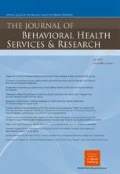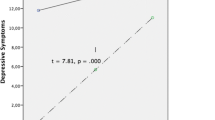Abstract
The purpose of this study was to estimate the relative contributions of trauma, chronic stress burden, depression, anxiety, social support, and social undermining in predicting alcohol and drug abuse, and whether ethnicity moderated these relationships. A multi-ethnic sample of 288 HIV-positive and HIV-negative women was recruited. Multiple group path analysis indicated that greater drug dependence was associated with being HIV+, more depression, and higher chronic burden. Trauma was related only to anxiety. Also, greater alcohol dependence was associated with more depression and more social undermining, and these effects were moderated by ethnicity. African American and Latina women evidenced different relationships between depression, social support and social undermining. Depression, social support and social undermining served as intervening variables in influencing the relationships between the other psychosocial variables and drug and alcohol dependence. The implications of these findings for alcohol and drug abuse research and services are discussed.




Similar content being viewed by others
References
Cohen S, Herbert TB. Health psychology: psychological factors and physical disease from the perspective of human psychoneuroimmunology. Annual Review of Psychology. 1996;47:113–142 doi:10.1146/annurev.psych.47.1.113.
Wyatt GE, Vargas Carmona JV, Loeb TB, et al. HIV-positive black women with histories of childhood sexual abuse: patterns of substance use and barriers to health care. Journal of Health Care for the Poor and Underserved. 2005;16:9–23 doi:10.1353/hpu.2005.0120.
Bing E, Burnam MA, Longshore D, et al. Psychiatric disorders and drug use among human immunodeficiency virus-infected adults in the United States. Archives of General Psychiatry. 2001;58:721–728 doi:10.1001/archpsyc.58.8.721.
Liu H, Longshore D, Williams JK, et al. Substance abuse and medication adherence among HIV-positive women with histories of child sexual abuse. AIDS and Behavior. 2006;10:279–286 doi:10.1007/s10461-005-9041-y.
Merikangas KR, Mehta RL, Molnar BE, et al. Comorbidity of substance use disorders with mood and anxiety disorders: results from the international consortium in psychiatric epidemiology. Addiction Behavior. 1988;23:893–907 doi:10.1016/S0306-4603(98)00076-8.
Turner BJ, Fleishman JA, Wenger N, et al. Effects of drug abuse and mental disorders on use and type of antiretroviral therapy in HIV-infected persons. Journal of General Internal Medicine. 2001;16:625–633 doi:10.1046/j.1525-1497.2001.016009625.x.
Center for Disease Control and Prevention (CDC). Fact Sheet: HIV/AIDS among African Americans. http://www.cdc.gov.hiv/pubs/facts/AfricanAmerican.html.html. Accessed August 5, 2007.
Lang AJ, Rodger CS, Laffaye C, et al. Sexual trauma, posttraumatic stress disorder, and health behavior. Behavioral Medicine. 2003;28:150–158.
Wyatt GE, Myers HF, Williams JK, et al. Does a history of trauma contribute to HIV risk for women of color? Implications for prevention and policy. American Journal of Public Health. 2002;92:660–665.
Larson MJ, Miller L, Becker M, et al. Physical health burdens of women with trauma histories and co-occurring substance abuse and mental disorders. The Journal of Behavioral Health Services and Research. 2005;32:1094–3412.
Resnick HS, Kilpatrick DS, Danski BS, et al. Prevalence of civilian trauma and posttraumatic stress disorder in a representative national sample of women. Journal of Consulting and Clinical Psychology. 1993;61:984–991 doi:10.1037/0022-006X.61.6.984.
Pole N, Best SR, Weiss DS, et al. Effects of gender and ethnicity on duty-related posttraumatic stress symptoms among urban police officers. Journal of Nervous and Mental Disease. 2001;189:442–448 doi:10.1097/00005053-200107000-00005.
Breslau N, Kessler RC, Chilcoat HD. Trauma and posttraumatic stress disorder in the community: the 1996 Detroit Area Survey of Trauma. Archives of General Psychiatry. 1998;52:1048–1060.
Jacobsen LK, Southwick SM, Kosten TR. Substance use disorders in patients with posttraumatic stress disorder: a review of literature. The American Journal of Psychiatry. 2001;158:1184–1190 doi:10.1176/appi.ajp.158.8.1184.
Kilpatrick D, Resnick HS, Saunders BE, et al. Victimization, posttraumatic stress disorder, and substance use and abuse among women. International Journal of Addition. 1995;30:1079–1099.
Testa M, Parks KA. The role of women’s alcohol consumption in sexual victimization. Aggression and Violent Behavior. 1996;1:217–234 doi:10.1016/1359-1789(95)00017-8.
West CM, Williams LM, Siegel JA. Adult sexual revictimization among black women sexually abused in childhood: a prospective examination of serious consequences of abuse. Child Maltreatment. 2000;5:49–57 doi:10.1177/1077559500005001006.
Sandanger I, Nygard JF, Sorensen T, et al. Is women’s mental health more susceptible than men’s to the influence of surrounding stress? Social Psychiatry & Epidemiology. 2004;39:177–184 doi:10.1007/s00127-004-0728-6.
Tosevski DL, Milovancevic MP. Stressful life events and physical health. Current Opinion in Psychiatry. 2006;19:184–189 doi:10.1097/01.yco.0000214346.44625.57.
Amaro H, Larson MJ, Gampel J, et al. Racial/ethnic differences in social vulnerability among women with co-occurring mental health and substance abuse disorders: implications for treatment services. Journal of Community Psychology. 2005;33:495–511 doi:10.1002/jcop.20065.
Gurung RAR, Taylor SE, Kemeny M, et al. “HIV is not my biggest problem”: the impact of HIV and chronic burden on depression in women at risk for AIDS. Journal of Social & Clinical Psychology. 2004;23(4):490–511 doi:10.1521/jscp.23.4.490.40305.
Lesserman J, Whetten K, Lowe K, et al. How trauma, recent stressful events and PTSD affect functional health status and health utilization in HIV-infected patients in the south. Psychosomatic Medicine. 2005;67:500–507 doi:10.1097/01.psy.0000160459.78182.d9.
Taylor SE, Seeman TE. Psychosocial resources and the SES-health relationship. Annals of the New York Academy of Sciences. 1999;896:210–225 doi:10.1111/j.1749-6632.1999.tb08117.x.
Sun A. Relapse among substance-abusing women: components and processes. Substance Use & Misuse. 2007;42:1–21 doi:10.1080/10826080601094082.
Groh DR, Jason LA, Davis MI, et al. Friends, family, and alcohol abuse: an examination of general and alcohol-specific social support. The American Journal on Addictions. 2007;16:49 doi:10.1080/10550490601080084.
Chin D, Krosen K. Disclosure of HIV infection among Asian/Pacific Islander women: cultural stigma and support. Cultural Diversity and Ethnic Minority Psychology. 1999;5:222–226 doi:10.1037/1099-9809.5.3.222.
Smith DW, Letourneau EJ, Saunders BE, et al. Delay in disclosure of childhood rape: results from a national survey. Child Abuse & Neglect. 2000;24(2):273–287 doi:10.1016/S0145-2134(99)00130-1.
Vinokur A, Van Ryn M. Social support and undermining in close relationships: their independent effects on the mental health of unemployed persons. Journal of Personality and Social Psychology. 1993;65:350–359 doi:10.1037/0022-3514.65.2.350.
Wyatt GE, Lawrence J, Vodounon A, et al. The Wyatt sexual health questionnaire: a structured interview for female sexual history taking. Journal of Child Sexual Abuse. 1992;1:51–68 doi:10.1300/J070v01n04_04.
Straus MA. Measuring intrafamily conflict and violence: the conflicts tactics (CT) scales. Journal of Marriage and the Family. 1979;4:75–88 doi:10.2307/351733.
Radloff LS. The CES-D Scale: a self-report depression scale for research in the general population. Applied Psychological Measurement. 1977;1:385–401 doi:10.1177/014662167700100306.
Derogatis LR, Rickels K, Rock AF. The SCL-90 and the MMPI: a step in the validation of a new self-report scale. British Journal of Psychiatry. 1976;128:280–289.
Sarason IG, Levine HM, Basham RB, et al. Assessing social support: the social support questionnaire. Journal of Personality and Social Psychology. 1983;44:127–139 doi:10.1037/0022-3514.44.1.127.
Kessler RC, McGonagle KA, Zhao S. Lifetime and 12-month prevalence of DSM-III-R psychiatric disorders in the United States: results from the national comorbidity study. Archives of General Psychiatry. 1994;51:8–19.
Byrne BM, Shavelson RJ, Muthén B. Testing the equivalence of factor covariance and mean structures: the issue of partial measurement invariance. Psychological Bulletin. 1989;105:456–466 doi:10.1037/0033-2909.105.3.456.
Little RJA, Rubin DB. Statistical Analysis with Missing Data. New York: Wiley; 1987.
Schafer JL, Graham JW. Missing data: our view of the state of the art. Psychological Methods. 2002;7:147–177 doi:10.1037/1082-989X.7.2.147.
Satorra A, Bentler PM. Corrections to test statistics and standard errors in covariance structure analysis. In: von Eye A, Clogg CC, eds. Latent variables analysis: Applications for developmental research. Thousand Oaks, CA: Sage; 1994:399–419.
Bentler PM, Yuan K-H. Structural equation modeling with small samples: test statistics. Multivariate Behavioral Research. 1999;34:181–197 doi:10.1207/S15327906Mb340203.
Hu L, Bentler PM. Cutoff criteria for fit indexes in covariance structure analysis: conventional criteria versus new alternatives. Structural Equation Modeling. 1999;6:1–55.
Ullman JB. Structural equation modeling. In: Tabachnick BG, Fidell LS, eds. Using multivariate statistics (5th Ed). New York, NY: Allyn & Bacon; 2007.
Bentler PM, Dijkstra T. Efficient estimation via linearization in structural models. In: Krishnaiah PR, ed. Multivariate analysis VI. Amsterdam: North Holland; 1985:9–42.
Satorra A, Bentler PM. A scaled difference chi-square test statistic for moment structure analysis. Psychometrika. 2001;66:507–514.
Brady KT, Sinha R. Co-occurring mental and substance use disorders: the neurobiological effects of chronic stress. American Journal of Psychiatry. 2005;162:1483–1493.
Galvan FH, Caetano R. Alcohol use and related problems among ethnic minorities in the United States. Alcohol Research & Health. 2003;27:87–94.
Newcomb MD, Carmona JV. Adult trauma and HIV status among Latinas: effects upon psychological adjustment and substance use. AIDS and Behavior. 2004;8:417–428.
Zemore SE. Re-examining whether and why acculturation relates to drinking outcomes in a rigorous, national survey of Latinos. Alcohol Clinical & Experimental Research. 2006;2:2144–2153.
Acknowledgments
This research was supported in part by the National Institute of Mental Health grants Nos. MH073453-01A1 and T32 MH17140, by the National Institute of Drug Abuse grant Nos. DA 01071-34 and DA-01070-34, and by The Pittsburgh Mind-Body Center (PMBC; NIH grant Nos. HL076852/076858). The authors dedicate this manuscript to the memory and the many contributions our colleague and friend, Douglas Longshore, Ph.D., made to the study of the psychosocial contributors to substance abuse.
Author information
Authors and Affiliations
Corresponding author
Rights and permissions
About this article
Cite this article
Myers, H.F., Sumner, L.A., Ullman, J.B. et al. Trauma and Psychosocial Predictors of Substance Abuse in Women Impacted by HIV/AIDS. J Behav Health Serv Res 36, 233–246 (2009). https://doi.org/10.1007/s11414-008-9134-2
Received:
Accepted:
Published:
Issue Date:
DOI: https://doi.org/10.1007/s11414-008-9134-2




